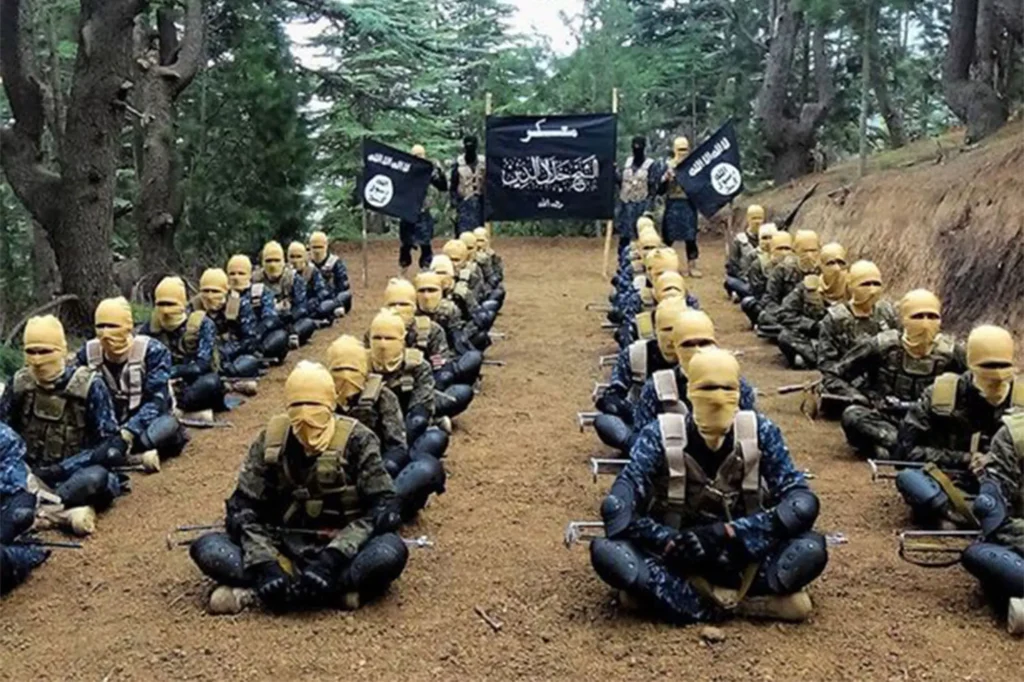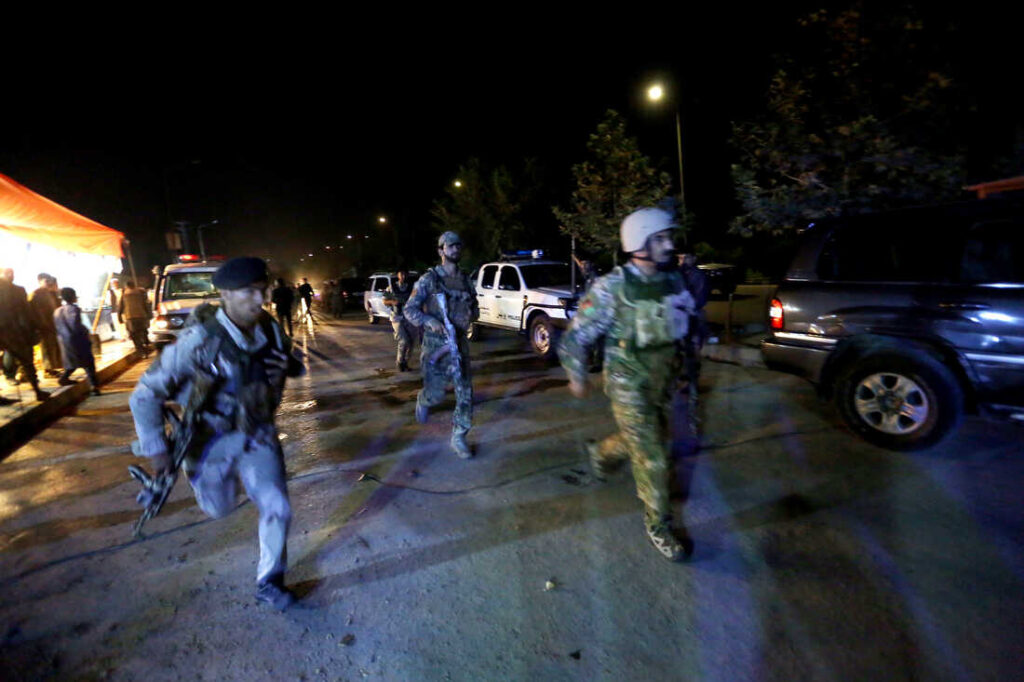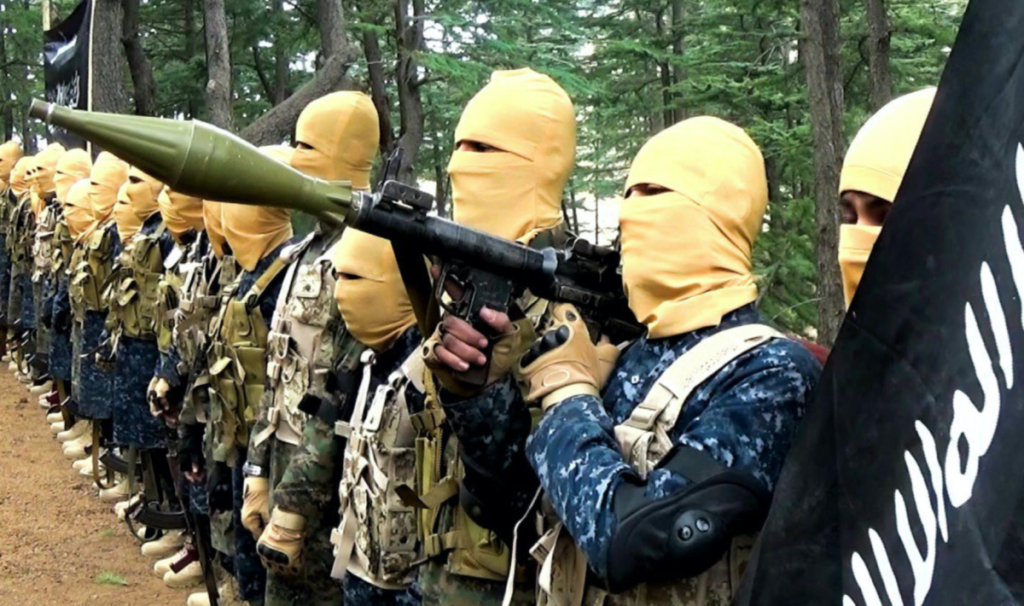MANTRAYA DATABASE#02: 03 OCTOBER 2015

5 January – Afghanistan President Ashraf Ghani expresses concern over the growth of the Islamic State and its possible impact in the country.
10 January – The Islamic State releases a video showing former Taliban commanders pledging allegiance to the IS and beheading a Pakistani soldier.
10 January – Under the leadership of Mullah Abdul Rauf, the Islamic State starts recruiting and operating in some provinces of Afghanistan including Helmand.
14 January – Reports of turf wars between the Islamic State and the Taliban emerge in Afghanistan. Fighting between militants of the two groups occur as both try to advance their agenda in the region.
15 January – Shaheen Tanki, a youth from Kalyan, who had travelled to Iraq to join the Islamic State reportedly killed in fighting in Iraq.
16 January – Islamic State recruit Salman Moinuddin arrested at Hyderabad airport as he attempts to travel to Iraq.
16 January – NATO commander John Campbell confirms that the Islamic State is recruiting in Afghanistan and Pakistan.
18 January – Senior Afghan commander Lt. Murad Ali Murad confirms IS existence in Afghanistan and claims a number of entities are trying to recruit under the IS flag.
18 January – Police in Bangladesh claim to have arrested four Islamic State militants including the local coordinator, Mohammad Sakhawatul Kabir. The group was attempting to acquire funds and carry out attacks in Bangladesh in a bid to set up the Caliphate. Kabir is believed to have received training in Pakistan.
21 January – Security officials arrest IS commander, Yousaf al-Salafi in Lahore. He was the Pakistani representative of IS and he and his colleagues were involved in sending fighters to Iraq and Syria.
22 January – Afghan Intelligence Chief Rahmatullah Nabil says that the Islamic State doesn’t pose a serious threat and that Afghan security forces have the capability to handle them.
29 January – Islamic State spokesperson, Abu Muhammad al-Adnani through a video message posted on Jihadi forums announced that the outfit has presence in Khorasan.
30 January – Jundullah, the group that had pledged allegiance to the IS in Pakistan bombs a Shia mosque in southern Pakistan killing 31 people.
30 January – Taliban captures defector Mullah Abdul Rauf and 55 other suspect IS militants.
9 February – NATO drone strike kills Mullah Abdul Rauf.
14 February – British Citizen of Bangladeshi origin, Rehana Begum Islam flees to Syria through the Turkish border with her two children.
17 February – Two of three British School girls who joined the Islamic State by flying to Turkey were of Bangladeshi descent.
21 February – 30 Maldivian jihadists who had joined the Islamic State reported to have returned home.
26 February – The Islamic State and all its affiliate groups banned in India against the Unlawful Activities Prevention Act.
6 March – Jihadist from Bhatkal, Karnataka named Sultan Abdul Kadir Armar dies fighting for the Islamic State on the Syria-Turkey border. News posted on the site of Indian jihadist group, Ansar al-Tauhid fi’Bilad al-Hind.
16 March – Afghan Ministry of Defence says the militant commander who pledged allegiance to the Islamic State, identified as Hafiz Wahidi, has been killed.
19 March – Indian Home Minister Rajnath Singh says “I am happy to note that the influence of Islamic State on the Indian youth is negligible. The failure of ISIS to attract Indian Muslims, who constitute the second largest Muslim population in the world, is due to their complete integration into the national mainstream. Indian Muslims are patriots and are not swayed by fundamentalist ideologies. Extremism is alien to their nature”.
21 March – Afghan President Ashraf Ghani acknowledges IS presence in Afghanistan. He says rather than a traditional militant structure, IS is better characterized as a network in Afghanistan.
24 March – Two Bangladeshi hostages, Hossain and Uddin released by IS after 18 days of captivity, after being abducted from a Libyan oil field.
28 March – Indian spiritual guru, Sri Sri Ravishanker’s Malaysian chapter receives threat from the IS asking to cancel its events involving the spiritual guru and warns of potential consequences.
15 April – The estimated number of Maldivian men fighting for the IS is pegged at 200. The Maldivian Government, however, confirms 57 such cases.
16 April – Leader of Islamic State in Pakistan, Hafiz Saeed reportedly killed while planting a bomb in the Northwest tribal part of the country.
16 April – American citizen, Debra Lobo killed by four gunmen in Karachi, IS leaflets found at the scene of crime.
18 April – IS claims responsibility for a suicide attack that killed at least 35 people in Jalalabad.
5 May – Police confirm death of Hyderabad youth Mohammad Ateef Waseem who had joined IS in February.
6 May – 14 students arrested at Hyderabad airport as they attempt travelling to Iraq and Syria.
6 May – Media reports the arrest of five youths from Ratlam in Madhya Pradesh in April. They were the first Islamic State linked Jihad cell in India to be arrested. The group was led by Imran Khan Muhammad Sharif who also had links to Indian Mujahedeen operative Muhammad Shafi Armar.
13 May – Jundullah, the IS affiliate in Pakistan launches another attack in Karachi abroad a bus opening fire at commuters killing at least 43 people.
17 May – Over 200 religious scholars in India belonging to different sects issue fatwa against suicide attacks. They also mention that IS has no basis in Islam and its philosophy is misleading.
17 May – Pakistan Interior Minister Chaudhry Nisar Ali Khan denies IS presence in Pakistan.
20 May – The National Investigation Agency (NIA) in India says that the four youths from Kalyan who joined the Islamic State were planning attacks on India. The report submitted by NIA to the Court also cites that the IS tried to link itself with local outfits planned to recruit Indians and NRIs.
23 May – Commander of International forces in Afghanistan, John F Campbell says that IS is recruiting and attracting fighters from Afghanistan.
24 May – Two men identified as Aminul Islam and Sakib Bin Kamal arrested in Dhaka for planning to fight for the IS. Islam was an IT head in an MNC and Kamal was a schoolteacher. In total, 12 people have reportedly joined the Islamic State from Bangladesh so far.
25 May – Ongoing clashes between the Taliban and the Islamic State in Afghanistan leave 27 insurgents dead, 15 from IS and 12 from the Taliban.
30 May – Bangladesh police arrest Abdullah Al-Galib. He recently launched the terrorist outfit “Junud At-Tawheed Wal Khilafah” in a bid to establish an IS like Caliphate in Bangladesh.
3 June – Islamic State militants behead 10 Taliban soldiers in Afghanistan as fighting between the two groups intensifies. A number of Taliban fighters continue to deflect to IS as its influence grows in Afghanistan.
7 June – Suspected IS member arrested in Dhaka and taken in for questioning. He possessed hi-tech computer technology and books that encouraged Jihadism.
13 June – Islamic State flag waved at a pro-Pakistan rally in Kashmir.
16 June – Taliban warn the Islamic State about exerting its influence in Afghanistan. In a letter addressed to Abu Bakr al- Bagdadi, they emphasize the need to for ‘one flag, one leadership’.
19 June – Islamic State flag waved again in Kashmir during a separatist rally in Southern Kashmir to commemorate the death anniversary of leader Qazi Nisar Ahmed.
30 June – India bans trade with Islamic State linked entities. This includes oil, cultural and religious items.
3 July – Indian Army claims the Islamic State is trying to gain foothold in Pakistan occupied Kashmir. “Whatever inputs we have, IS has not taken in a major way, but they are definitely trying to gain foothold in the area (PoK)”, General Officer Commanding (GoC), 16 Corps, Lt Gen K H Singh told reporters on sidelines of an army function Jhangar, in Noushera.
5 July – Law enforcement agencies arrest three suspected Islamic State members in Lahore. They were identified as Asmatullah and Abdur Rahman from Afghanistan and Muhammad Ibrahim in Punjab.
8 July – Foreign Office spokesperson Qazi Khalilullah reveals Pakistan’s decision to refer to IS as ‘Daesh’ rather than its preferred name, Islamic State.
17 July – Pakistani and Islamic State flags hoisted outside Jamia Masjid in Srinagar.
21 July – First reports of a Sri-Lankan man, identified as Abhu Shuraih Sailani, reportedly killed while fighting in Syria. Sailani was educated in Shariah Law from Pakistan.
22 July – US Senate Panel calls for continued cooperation between Islamabad and Washington to counter any threat posed by the Islamic State in the region.
24 July – Pakistan calls upon the UN Security Council for a comprehensive strategy against the Islamic State’s growing influence.
25 July – All Ceylon Jaaiyaathul Ulama (ACJU), the apex religious body of Islamic theologians inn Sri Lanka condemns IS and declare them un-Islamic and inhumane.
28 July – An Islamic State recruitment document found in Pakistan gives insight into the outfit’s plan to trigger a war in India which would result in an apocalyptic confrontation with America. The document was recovered from an individual with connections inside the Pakistani Taliban.
28 July – Police arrest eight militants belonging to Jama’atul Mujahideen Bangladesh (JMB), an organization that seeks to establish ties with IS in a bid to establish the Islamic State of Bangladesh.
1 August – Indian Home Ministry holds a meeting chaired by Union Home Secretary L C Goyal regarding the threat posed by the IS. Efforts to work for a counter-radicalisation strategy and need to monitor social media discussed. Representatives from a dozen key states including Hyderabad, Tamilnadu and Maharashtra attend the meeting.
2 August – Two of the four abducted Indians in Libya head back to India from Tunis. T. Gopalkrishna and K. Balram, teachers at Sirte University in Northern Libya, were abducted by an IS affiliate.
3 August – Islamic State affiliated twitter account tweets two pictures showing an IS training camp in Pakistan’s northwest tribal areas. Evidence suggest that the account is possibly being managed by a former Taliban fighter who defected to the Islamic State.
4 August – Indian Government estimates that 13 Indians have joined the Islamic State so far of which six are dead. 17 individuals have been prevented from joining the Islamic State by security agencies.
5 August – An Afghan official says that US drone strikes in Afghanistan have killed 60 militants associated with the Islamic State in the provinces of Nangarhar and Paktika.
10 August – IS releases video of its fighters executing 10 prisoners, believed to be from the Shinwari tribe accused of helping the Taliban in the Nangarhar province.
29 August – Pakistan bans the Islamic State. The Interior Ministry’s announcement comes against the background of Islamic State’s inroads into parts of Pakistan and Afghanistan.
31 August – Militants linked to the Islamic State threaten to kill Maldivian President Abdullah Yameen and Vice President Ahmed Adeeb if the opposition leader Sheikh Imran Abdulla isn’t released within 30 days. Abdulla was jailed based on charges of inciting violence and had demanded the resignation of President over the jailing of Former President Mohamed Nasheed.
(Compiled by Surya Valliappan Krishna. This timeline is a part of Mantraya’s “Islamic State in South Asia” project. Surya is a lead researcher with the project.)



